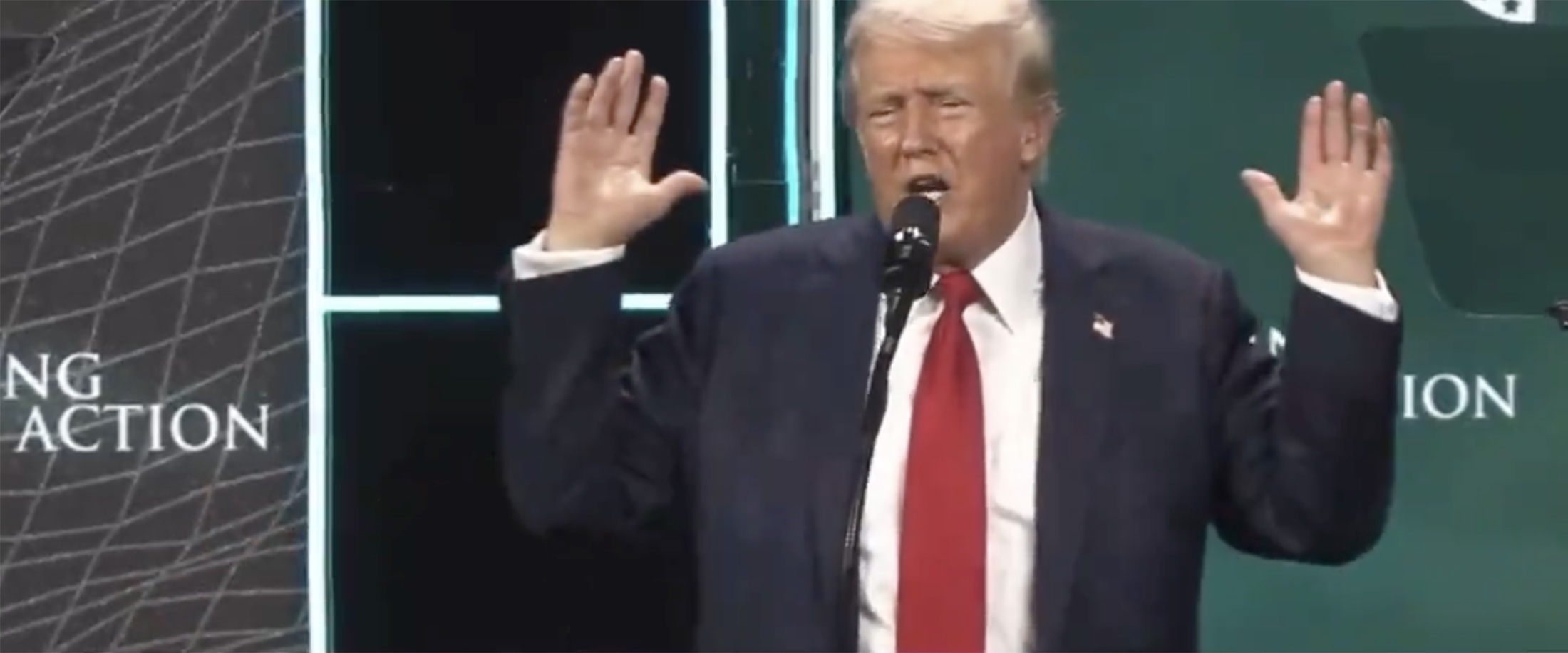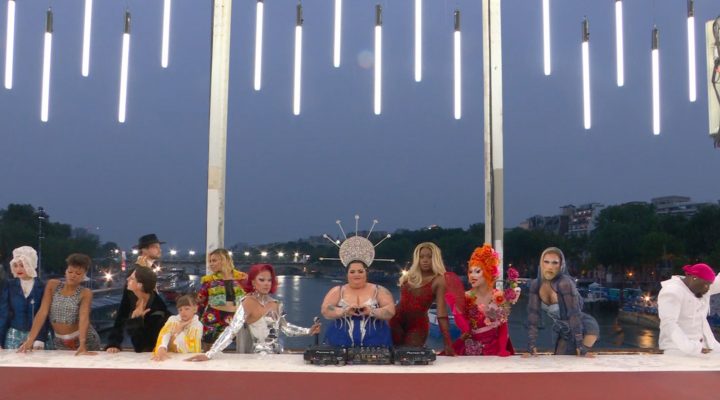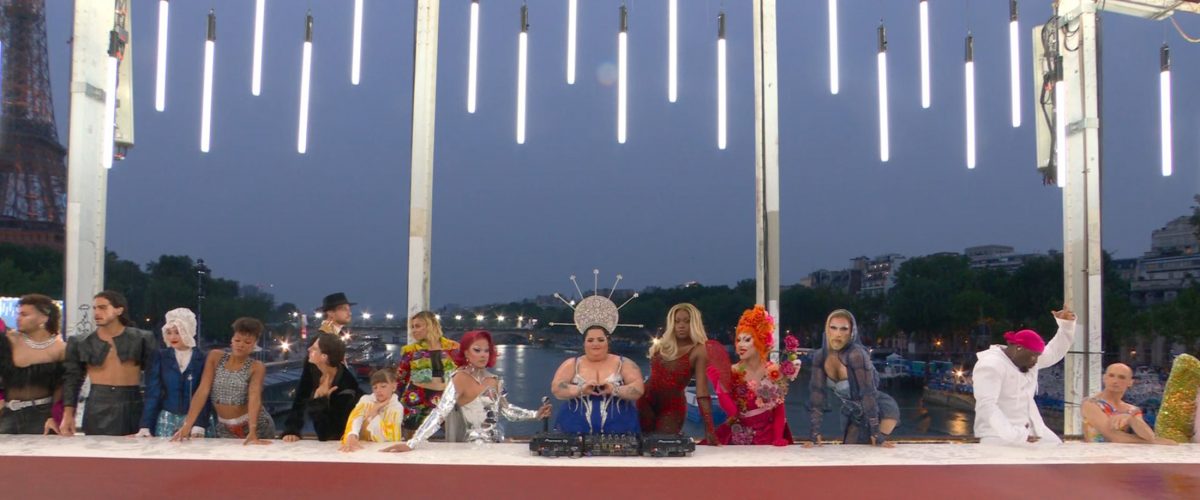“Teacher! Billy stuck his tongue out at me!”
You’re the teacher. Take a moment to think about how you’d respond.
Many folks would say, “Billy? Did you stick your tongue out at Jimmy? … Tell me the truth. … OK. Apologize.”

Brad Bull
Meanwhile, the class has a paradoxical reaction. They think Jimmy is a wuss, but their main takeaway is that tattling is effective. Plus, neither Jimmy nor Billy has learned to constructively manage emotions and proactively deal with each other. But that is the help Jimmy was asking for, even if he doesn’t know it.
This all comes to mind as I watch Christians’ reactions to a moment in the opening ceremony of the Paris 2024 Olympics. When I got home, running late for the ceremony, I opened my phone to confirm the time and TV network. My screen was on Facebook, and I saw a complaint that something insulting to Christians had happened, which the person felt warranted not watching the Olympics.
I asked what happened but didn’t get a response until much later. Meanwhile I saw some actors portraying what looked to me like a tableau echoing Leonardo da Vinci’s painting Last Supper. Later, I saw folks online complaining the Last Supper was portrayed by people in drag.
This morning, my social media feeds were aflame with images of the enacted tableau. Fellow Christians were shouting their indignation. Here’s an example of one such post:

Clint Pressley, the new president of the Southern Baptist Convention, speaking generally, posted on TwitteX (as I call it), “I won’t post anything from opening ceremonies of the Olympics because it’s too foul(,) but mercy what a debauched way to begin athletic competition at the highest level.”
Responding to a post showing the “drag Last Supper” in particular, self-described “cultural Christian” Elon Musk replied, “This is extremely disrespectful to Christians.”
Is this righteous indignation?
I want to think aloud about this: Is all this righteous indignation? If so, is it being stated in a righteous way?
First, what is righteous indignation? Well, first, why even ask?
Of all the many relationship books I read in my many years of school, I consider the most important to be Raising an Emotionally Intelligent Child by John Gottman, Joan DeClaire and Daniel Goleman. The authors say a first step in emotion coaching is seeing a child’s emotional outburst as an opportunity. Another step is to help identify what emotion is going on. Is it anger, fear or what? Labeling the emotion involves asking questions. A child who made a C on a math test might be sad, angry or elated.
Based on the comments I’ve read, it seems pretty clear many evangelical Christians are reacting to the tableau out of anger and fear. Let’s put a pin there a moment.
In a seminary ethics class, we had to read Glenn Stassen’s book Just Peacemaking: The New Paradigm for the Ethics of Peace and War. I recall him asserting one of the first steps in peacemaking is to acknowledge any legitimate concern of the parties.

With that in mind, I’ve heard Christians — especially fellow American Christians — express fear of immorality run amok. Wanting to avoid children being molested by rogue predators is a legitimate concern. Many Christians fear erosion of what they — and even secular folks — would deem wholesome behavior, although what constitutes that is as mercurial as skirt and beard length.
Taking only church attendance as an indicator, Christianity clearly has lost much of its social power in the United States and other countries. This leads to fear. To be fair, though, I did see one online comment in which the person said he wasn’t a Christian, but he felt the tableau was offensive because it seemed to attack a religion. He asserted that we “know why” it felt safe to attack Christianity rather than other religions.
“The bottom line is, it seems clear many Christians are reacting from fear and anger.”
I’m not sure, but maybe he was inferring Christian terrorists would not attack Paris like Islamic terrorists did when slighted by a Charlie Hebdo cartoon. If that’s his belief, he hasn’t done a broad reading of history. The bottom line is, it seems clear many Christians are reacting from fear and anger.
But let’s get back to whether it’s righteous anger. Wikipedia states: “Righteous indignation … is anger that is primarily motivated by a perception of injustice or other profound moral lapse.” But it goes on. “It is distinguished from anger that is prompted by something more personal, like an insult.”
Now, things just got messy. While offense is felt within an individual, that doesn’t make something a personal insult. Is the issue here an insult of a person or to a broader group? If speaking up for someone treated unjustly, then it would be righteous indignation.
But there’s the rub. How rooted in reality is the perception of injustice? That will emerge in days ahead. I’ve repeatedly learned that artistic work is rarely understood at first glance. Are the upset Christians saying a trans person would not be welcome at the table of Jesus? Were the artists trying to say such people are? What was the significance of a child being seated in the position of Judas?
I don’t know. And that’s why it’s important to ask questions and listen before reacting.
I do know that Thomas Jolly, artistic director of the event, was quoted as saying this was his vision for the opening ceremony’s message: “We have the right to love who we want. We have the right not to be worshippers. We have a lot of rights(,) and this is what I wanted to convey.”
“Why do Christians keep being surprised when secular people act … secular?”
I already can hear folks rightly saying that in the context of a ceremony that portrayed the formation of a sexual threesome: “No, if you want to sexually love a child like the one sitting at that table, you don’t have the right to do that.” That’s a fair critique of a portion of a statement that was incomplete at best and reckless at worse.
Shortly after I submitted the original version of this article, I was glad I had said, “I don’t know” what was intended by the tableau. Now, news is emerging that the tableau depicted not the Last Supper but a very similar set of paintings depicting the Feast of Dionysus — the Greek god of festivities and feasting. While some of the images of the tableau show 13 people, most show more than 13, consistent with the paintings of Dionysian paintings and not the Last Supper.
What if these outraged evangelicals got worked up because of a wrong assumption?
Why do Christians keep being surprised when secular people act … secular? What do we have to learn from Jolly saying, “We have the right not to be worshippers”? Why are he and folks like him feeling that way? I bet they, too, have legitimate beefs.
How should we express indignation?
While the meaning and appropriateness of the performance will continue to emerge and be debated, there is a more pressing question in moments like this: If necessary, how do we righteously express indignation?
Low and behold, following the example of Jesus, it might be to take a moment to kneel in silence and doodle in the dirt with a stick. The eventual response might be to speak up for others.
When Jesus was personally attacked, he didn’t attack back. Yes, he got nasty with those selling sacrifices in the temple, because they were exploiting others in the name of religion.
Christians would be better off to sit back and let non-Christians say, “Hold on, now!” That would come off so much better. Why? Because nobody likes a tattletale.
However, we also know it works and we do it, even if it makes us look bad.
“If someone had a goal of getting under evangelical Christians’ skin, it seems to be working.”
With Jimmy whining about it, Billy knows he’s gotten under Jimmy’s skin. So if someone had a goal of getting under evangelical Christians’ skin, it seems to be working.
How do non-Christians perceive this?
Christians are called to be salt and light. So how do non-Christians perceive all these memes and comments? I’ve been attending church and nurtured in my Christian faith since nine months before I was born. But even I laughed — and I’m sorry if this sounds condescending — when I read this comment about the tableau enactment: “This is what America has come to.”
Oh, for heaven’s sake. The event was written, produced and performed in France. That kind of comment just makes non-Christians see Christians not as salt and light but as “bless their heart” silly.
To check on this I contacted some friends and asked their take on how Christians were reacting to the tableau. Two replied in the necessary timeframe.
One is a passionate atheist. He said:
I think once again Christians are cherrypicking the Bible to match their personal views. It’s funny how if it had been any of the other 3,999 gods that “exist” they wouldn’t have had a problem with it, but because it’s the one they like it shouldn’t be done. Shit, if it’s a woman that made the comment(,) why is she even speaking right? America is embarrassing. As a veteran, I am completely disenfranchised by these bigoted assholes. America likes to take themselves so seriously, but we’re a bunch of idiots like everywhere else. Maybe if we could have a little bit of a sense of humor with each other we could stop killing each other over who’s imaginary friend is cooler, because as a guy that’s lost a good number of friends to it, it’s pretty … ridiculous.
Another friend — one of many of many similar friends — grew up in a devout Christian family but has expressed feeling disenchanted with Christianity, a version of which featured — among other negative experiences — very harsh parenting. This person said:
I am in such a dynamic spiritual place, it is just the coolest ever. … I have become consciously apolitical. It’s just not the most high(-)value place for me to put my energy. … But as far as the question you ask — I was barely aware of it, didn’t know that it was supposed to be a Last Supper recreation, though I see that now. I also have been mostly unaware of the reaction to it. I have no comment on that specifically. At this point in my life, I do not give it any energy. I’m (officially middle aged now). I have no time to waste!
Note that one of these folks is a combat veteran (yes, there are atheists in foxholes) who at other times has told me he “didn’t fight” to have America lose freedoms to religious extremists. The other person grew up very active in church. Neither of these people experience an enhanced view of Christianity by folks up in arms about feeling insulted.

Donald Trump speaks to a group of conservative evangelicals Friday, July 26, in West Palm Beach, Fla. (Screencap)
But not indignant about this other thing?
Meanwhile back at the ranch, though, something else happened Friday. As the Olympics kicked off, an American presidential candidate addressed Christians at a political rally called Believers Summit. One hour and three minutes into the speech, the candidate began wrapping up with this:
Christians, get out and vote, just this time. You won’t have to do it anymore. Four more years, you know what, it will be fixed, it will be fine, you won’t have to vote anymore, my beautiful Christians. I love you, Christians. I’m a Christian. I love you. Get out, you gotta get out and vote. In four years, you don’t have to vote again. We’ll have it fixed so good you’re not going to have to vote.
A supporter of this candidate insisted to me that the comment is not a threat of fomenting a dictatorship but of making political appointments that will reduce election fraud. However, even if that is true, what does it say?
The non-Christian world hears evangelical Christians cheering that government will have such power that Christians won’t have to vote — and that Christians see voting as a burden. Nah, that’s nothing to fear, because the world surely doesn’t notice that at one place in the speech (minute 41) the candidate said, “They have early voting, late voting. Everything is so ridiculous. We should have one-day voting, paper ballots. … And that’s what we’re striving for.” But one minute earlier in the speech, the candidate said, “But, Christians, you know, you’ll go to church every Sunday … and I understand they’re doing lock boxes in churches, where people don’t have to go vote. They can vote in church.” Later (1:02:50), the candidate told the audience of Christians to utilize early or absentee ballots.
You can bet your potluck chicken that non-Christians hear that as double standards. But, by all means, let’s stay focused on Jesus spending his energy objecting to Roman culture and avoiding taking on the abuses of fellow religious people.
Nope, nothing to see here at this political rally. Let’s just keep shouting about our hurt religious feelings rather than speaking up for others and against those of our own tribe who help us keep political power.
Brad Bull has worked as a hospital chaplain, pastor and university professor. His dissertation addressed how parents mediate TV viewing with their children and teach critical viewing skills.
Related articles:
Evangelicals upset about the Olympics are pearl-clutching hypocrites | Opinion by Susan Shaw
Elect me, and you’ll never have to vote again, Trump promises evangelicals


